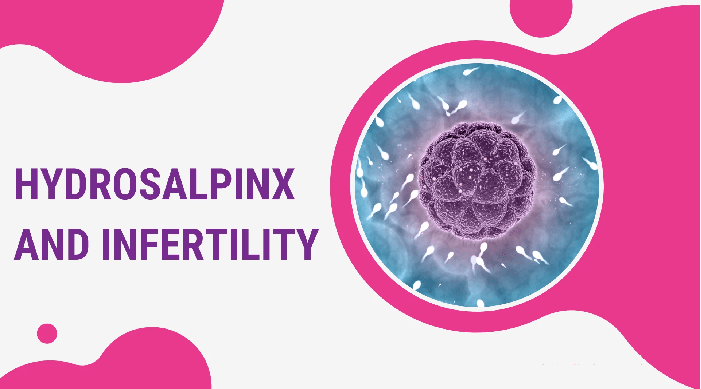Hydrosalpinx is simply a condition where a fallopian tube fills with fluid, causing a blockage. This fluid accumulating within the tubes can also harm sperm and embryos, drastically reducing fertility chances.
Dr. Pankhuri Gautam is an expert gyno from Jaipur. She explains that Hydrosalpinx is often triggered by an infection, such as Chlamydia or Gonorrhea, which leads to Pelvic Inflammatory Disease (PID). Scars from previous surgeries or conditions like Endometriosis condition, where uterine tissue grows outside the uterus, can also block these tubes.
Many women with hydrosalpinx experience no apparent symptoms, but some may encounter lower abdominal pain, unusual vaginal discharge, or discomfort during menstruation. These symptoms, especially when paired with challenges in conceiving, are strong indicators that it’s time to consult a fertility specialist.
By explaining Hydrosalpinx, how it affects your journey to motherhood, and how we can help you navigate this, Dr Pankhuri Gautam, a laparoscopic expert with a decade of experience, aims to empower you with the knowledge to make informed decisions about your fertility.
Ways In Which Hydrosalpinx Can Significantly Impact Fertility
- Fallopian Tube Blockage:
Hydrosalpinx creates a blockage in the fallopian tubes, which stops the egg’s journey from the ovary to the womb—essential for natural conception. When both tubes are compromised, the likelihood of conceiving naturally drops dramatically, often necessitating medical help.
As per IJM, Tubal blockage, primarily caused by pelvic inflammatory disease, is the leading cause of primary infertility in 60% of Eastern Indian women.
- Toxic Buildup:
The fluid that gathers in the fallopian tubes isn’t just stagnant; it’s harmful to both sperm and embryos. This toxic fluid can seep into the uterus, making it a hostile place for an embryo to implant and grow, drastically diminishing the likelihood of a successful pregnancy.
- Persistent Inflammation:
Hydrosalpinx is frequently linked with ongoing inflammation in the pelvic region. This inflammation can harm the reproductive organs, like the ovaries and uterus, further lowering conception chances and increasing miscarriage risks.
- Challenges with IVF:
For those turning to in vitro fertilization (IVF), hydrosalpinx can be an obstacle, as the harmful fluid can obstruct the implantation of embryos even when they’re meticulously placed in the uterus. Consequently, many fertility experts suggest addressing the fallopian tube issues before pursuing IVF.
- Ectopic Pregnancy Risk:
Even though natural conception is rare with hydrosalpinx, if it occurs, there’s a heightened risk of the pregnancy being ectopic—where the embryo grows outside the womb, typically in a fallopian tube.
- Lower Uterine Receptivity:
Hydrosalpinx can create an unfriendly environment for embryos in the uterus. Even if the embryo is healthy, the less receptive uterine lining may decrease the likelihood of a successful pregnancy.
- Emotional Toll:
Navigating infertility linked to hydrosalpinx can be emotionally draining, influencing a woman’s mental health and possibly her fertility, as stress and anxiety can indirectly affect the ability to conceive.
Treatment Options for Hydrosalpinx –
Treatment for hydrosalpinx aims to clear the blockages in the fallopian tubes to enhance fertility and alleviate symptoms. Some methods to treat the conditions are:-
Antibiotics—If an active infection has caused the hydrosalpinx, antibiotics may be used to address the infection, though they will not clear the blockage or fluid buildup.
Surgical Options-
Salpingectomy- Often preferred for women undergoing IVF, this procedure involves removing the affected tubes to prevent toxic fluid from interfering with embryo implantation.
Salpingostomy- This option creates a new opening in the tube to drain fluid and potentially restore its function, although there’s a risk of re-blockage.
Tubal Ligation Reversal- Consider if hydrosalpinx follows a tubal ligation; success heavily depends on the extent of damage.
Laparoscopy- A minimally invasive method used to diagnose and treat hydrosalpinx, allowing for direct removal or repair of tubes.
Drainage – Ultrasound-guided fluid drainage might temporarily relieve symptoms but does not solve the blockage.
Assisted Reproductive Technologies (ART)- IVF is recommended for those trying to conceive, with procedures often preceded by salpingectomy to boost success chances.
Hydrosalpinx Clip or Blockage – This technique involves placing a clip on the tube to block it, preventing fluid from affecting the uterus. It is usually done before IVF instead of removing the tube.
Management of Underlying Conditions- Addressing previous medical conditions like endometriosis or Pelvic Inflammatory Disease (PID) may involve additional medication or surgery.
Fertility Counseling and Support – We understand that navigating infertility linked to hydrosalpinx can be emotionally draining. That’s why we emphasize the importance of emotional and psychological support through fertility counseling. This support can help you cope with the challenges of infertility and explore treatment options, ensuring you feel understood and supported throughout your journey.
Conclusion-
In summary, hydrosalpinx significantly affects fertility by obstructing the fallopian tubes and introducing harmful fluids that can disrupt embryo development. Treatment approaches vary from using antibiotics to tackle infections to performing surgeries like salpingectomy to improve IVF outcomes.
Furthermore, managing associated health conditions and offering emotional support through fertility counseling is essential for addressing both the physical and emotional challenges of hydrosalpinx. By comprehensively understanding and treating these issues, individuals can better navigate this complication and increase their likelihood of a successful pregnancy.
Connect with Dr. Pankhuri Gautam, an expert Obstetrician, and gynecologist in Jaipur, for personalized guidance on Infertility and Hydrosalpinx. Her expertise can provide valuable insights.


